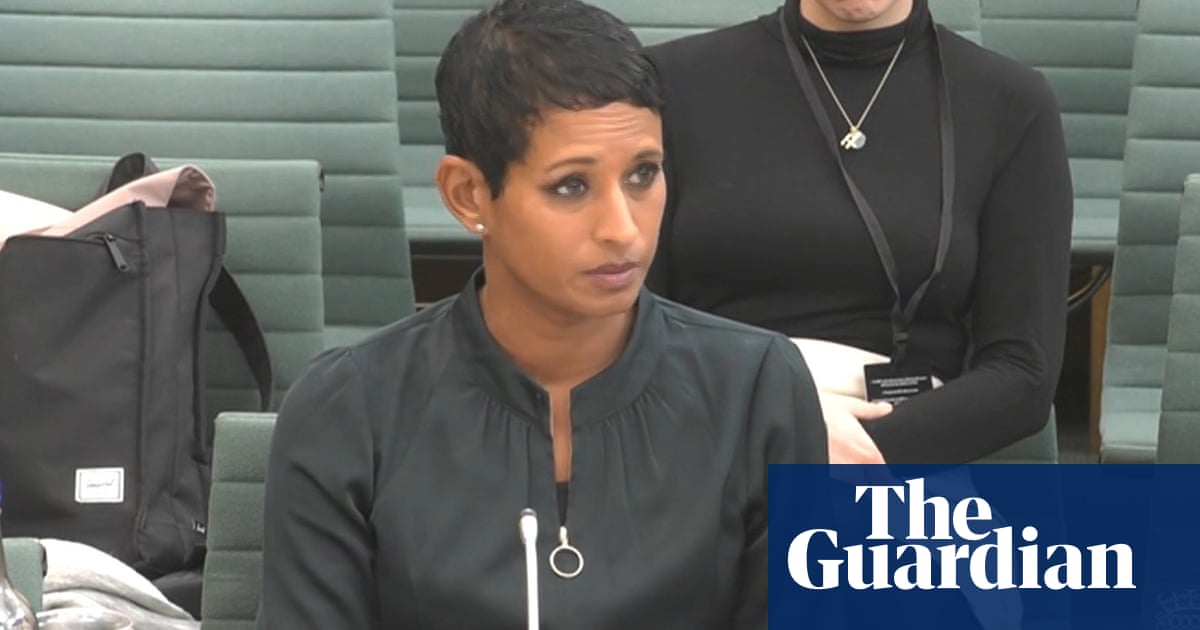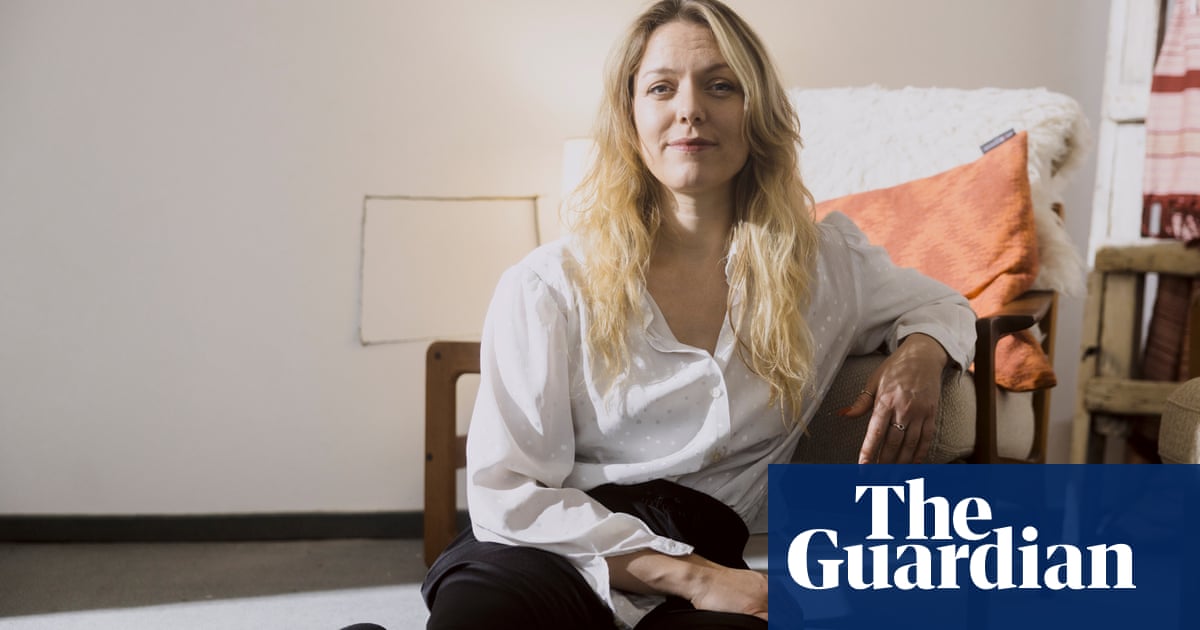
any schools are staying closed after Christmas, but, on the BBC’s two leading radio speech networks at 10am on Monday, there was a vivid sense of ringing bells and sharpened pencils. On Radio 4, Emma Barnett took over Woman’s Hour, with Naga Munchetty moving into the slot on Radio 5 live that Barnett occupied until December, bringing two of the finest broadcasters of the younger generation into scheduling competition.
Barnett started by reading out a letter the show had solicited from the Queen, congratulating Woman’s Hour on its 75th anniversary this year: a counterintuitive traditionalism from a 35-year-old presenter, although segueing to a specially recorded song by the former Spice Girl Mel C suggested a desire to cover the generational bases. Munchetty also started with music, reading her menu of the items coming up over a thumping drum’n’bass track, which seemed mainly designed to make the show sound different from Barnett’s reign, and from Munchetty’s other gig on BBC One Breakfast News.
The opening monologues spoke identically of “looking forward to getting to know” the listeners, part of the greater tendency of modern broadcasting towards emotionalism: the question used most often by each presenter to interviewees was: “How do/did you feel?”
Unusually, the recruitment of two women does not alter the gender balance of the airwaves; the 10am time-slot has had women simultaneously in charge on Radio 4 and Radio 5 since 2016, when Barnett took over mornings on Radio 5. And both have previously done holiday shifts on their new programmes, but having the front door keys, and being able to redecorate, is a very different proposition.
For the presenters, the challenges are opposite. Munchetty, most familiar with co-fronting TV formats punctuated by pre-recorded reports, now has much more solo opportunity. Barnett, used to three hours of radio airtime hosted alone, is now restricted to 43 minutes, with the last quarter of Woman’s Hour given to a short story or drama, which the presenter merely introduces and back-announces.
The show, most recently fronted by Dame Jenni Murray and Jane Garvey, also has a reputation for being tightly planned; presenters who go off-piste have found their bosses rapidly piste-off. Some listeners have also found it to be over-serious – Garvey sometimes felt audibly to be wrestling to intrude more humour – and excessively indebted to the social-services agenda.
Barnett’s 5 live style was built around politics, showbiz and debates fuelled by social media; on Monday, it felt as if she was craving more texts to interact with. But, as her appearances on 5 live and Newsnight were aimed at the entire audience, the most intriguing question was to what extent she will acknowledge the implication in the title of Woman’s Hour (anachronistic to some, controversial to others) that it has a restrictive remit.
Barnett started very Westminster, with what was billed as the “first interview” with Sonia Khan, the Treasury aide dismissed by the former chief Downing Street aide Dominic Cummings. This was less of a scoop than it might have been. Surprisingly, as Barnett thrives on live radio, the chat was recorded, perhaps because of BBC legal fears about discussing the shortsighted Durham explorer without an editing safety net. Khan then repeatedly refused to “get into what happened back then” when Cummings sacked her, preferring to “focus on the learnings”. (Might the show have seen this coming, as the ex-aide recently reached an out-of-court settlement with the government?)
Barnett used her considerable interviewing skill, but sounded increasingly frustrated, at one point somewhat tetchily telling Khan that she “must have” a view on Cummings. In retrospect, the second item should have been first. Daringly for Woman’s Hour, and possibly indicating Barnett’s intended flexibility with content, it was a conversation between two men – the admirable Richard Ratcliffe, whose wife, Nazanin Zaghari-Ratcliffe, remains under house imprisonment in Iran, and the former foreign secretary Jeremy Hunt.
This piece oozed news lines. The by-default diplomatic Hunt, who clearly wants to be back in the cabinet, was cajoled into accusing his successor, Dominic Raab, of a “clumsy” letter to Richard Ratcliffe, and also prodded by Barnett to demand that Boris Johnson needs now to “show personal interest” in the case of a British citizen whose legal defence in Iran was not helped by his loose-lipped comments, as foreign secretary, on her role in Tehran. There was also a nice human interest angle in Ratcliffe’s revelation that his six-year-old daughter had written to Johnson asking to have her mum back for Christmas; the prime minister reportedly replied that he would keep the letter on his desk as a reminder of the case.
In a very 5 live way, Barnett asked Hunt to stay on the line to answer Covid-related questions on vaccination and education, which was good journalism, but left somewhat rushed her subsequent interview with Imelda Staunton. In any case, that was a bit of a squib as its peg was a role, the older Elizabeth II in The Crown, that she hasn’t started filming yet.
Munchetty’s first show felt fluent even by the informal standards of 5 live, which was set up as an unbuttoned Radio 4; news bulletins turned up at unusual times (eg, 12.42pm), and began as an ad-libbed chat between presenter and newsreader.
The heart of day one was a long, involving interview, dominating the middle hour, with General Sir Nick Carter, chief of the defence staff, who clearly set out to give nothing away but, because of the questioning, failed. Thoughtfully exploring the extent of army involvement in the Brexit response that the public would tolerate, their conversation also contained fascinating data, such as the fact that the British army is involved in 39 active missions in 46 countries, and had 40,000 troops on high readiness over the Christmas and New Year period.
Thoughts for day two and beyond? Barnett sometimes sounded time-confined, and it would be sensible to shift the dropped-in fiction slot to give her more space. Munchetty needs technical advice on keeping keyboard rattle and paper flap off-mic.
But, on first-day form, the BBC has two sharp programmes with high-class presenters, although radio overlords may become concerned that these shows seem much closer in sound and content than when Murray and Barnett were going head to head. There seems a clear risk as well that Barnett will find herself in turf wars with the Today programme for subjects and guests, given that her core interests overlap so much with its.
The solution to those problems may be that within a few years, Barnett and Munchetty will be sitting around the Radio 4 studio breakfast table. For each of them, these new shows, which opened very enjoyably, feel like steps rather than destinations.












